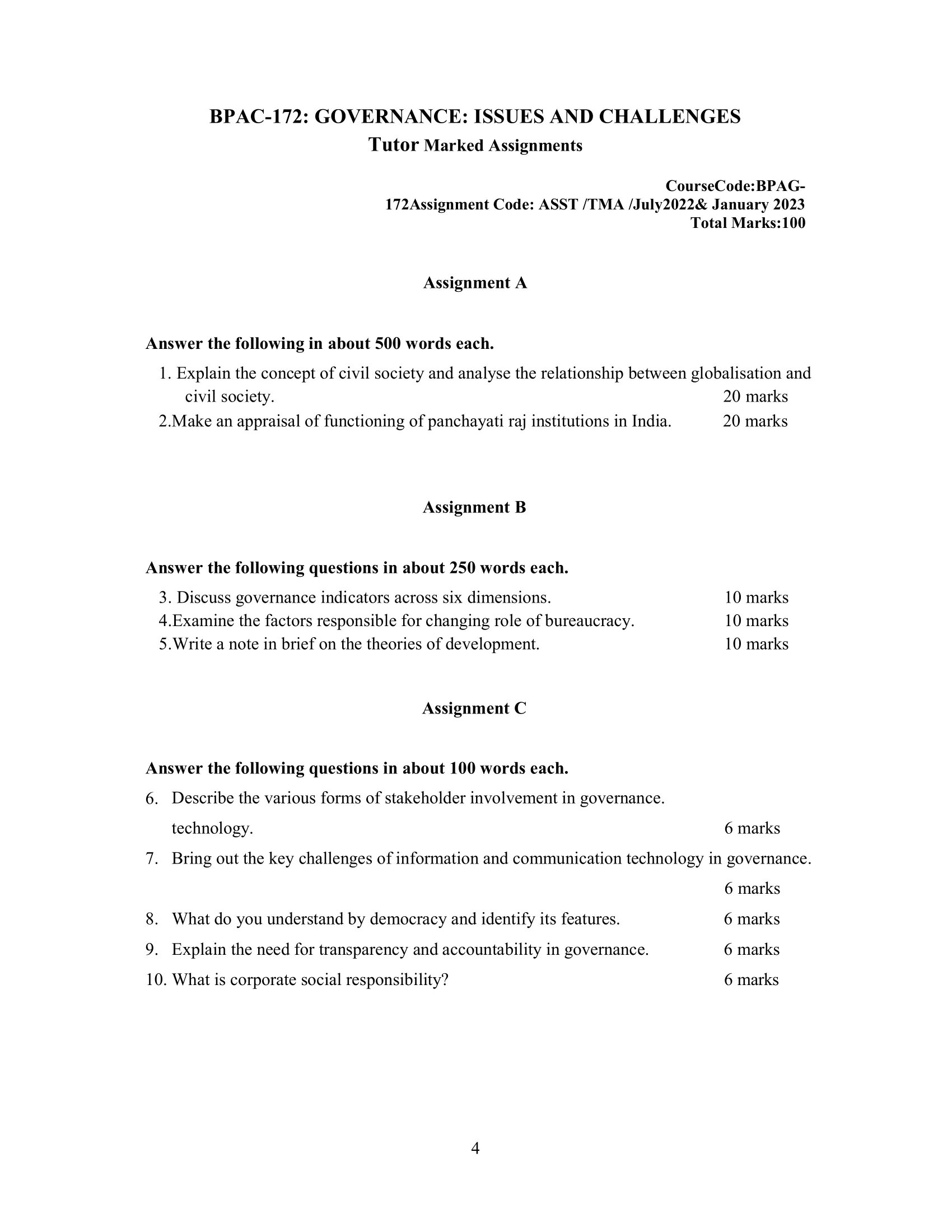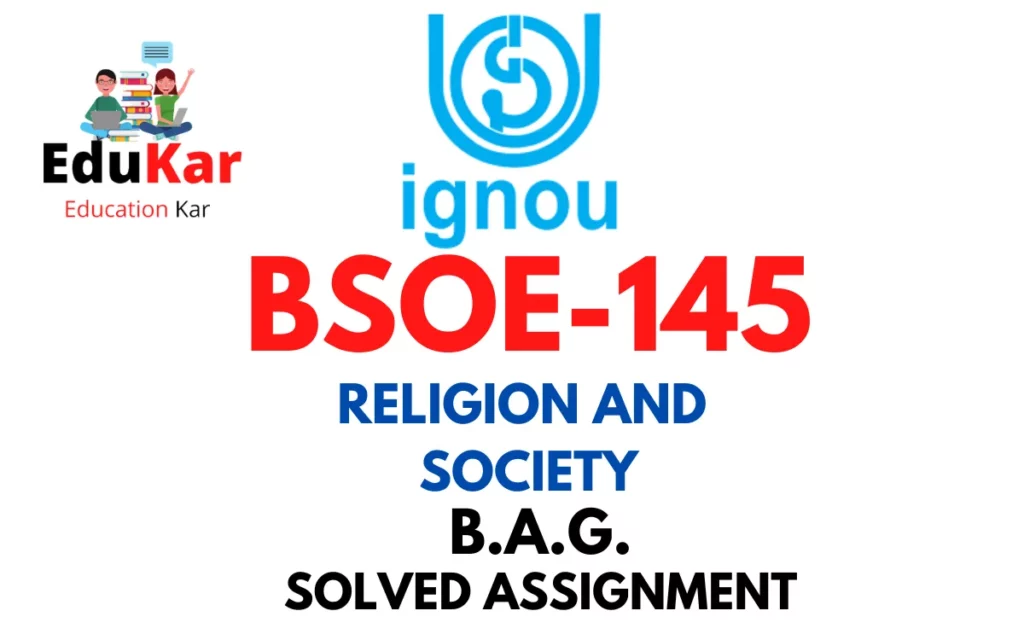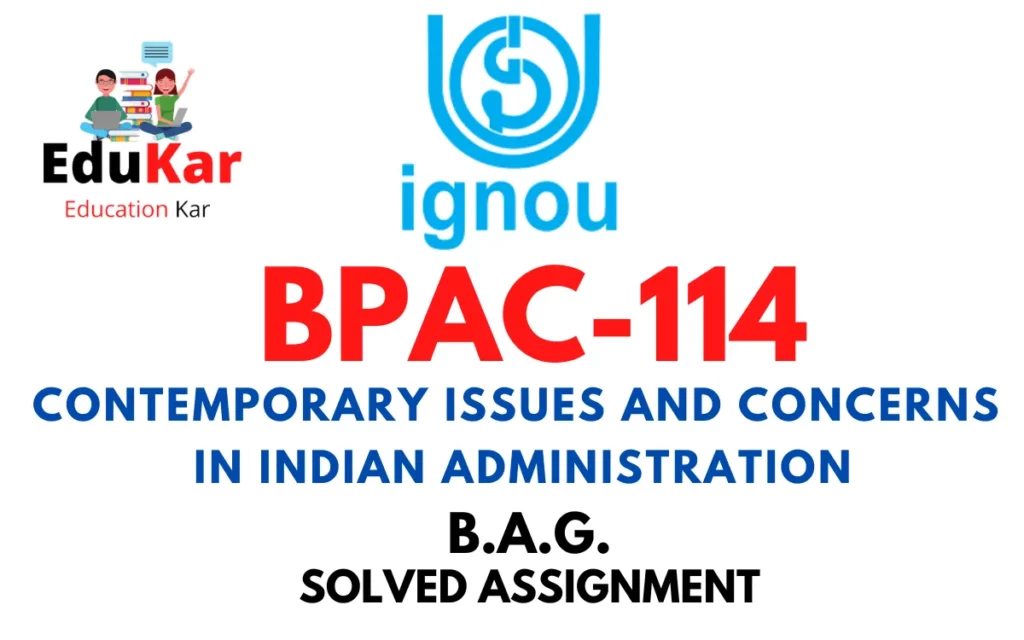Contents
- 1 Assignment A
- 2 Answer the following in about 500 words each.
- 3 1. Explain the concept of civil society and analyse the relationship between globalisation and civil society.
- 4 2. Make an appraisal of functioning of panchayati raj institutions in India.
- 5 Assignment B
- 6 Answer the following questions in about 250 words each.
- 7 3. Discuss governance indicators across six dimensions.
- 8 4. Examine the factors responsible for changing role of bureaucracy.
- 9 5. Write a note in brief on the theories of development.
- 10 Assignment C
- 11 Answer the following questions in about 100 words each.
- 12 6. Describe the various forms of stakeholder involvement in governance.
- 13 7. Bring out the key challenges of information and communication technology in governance.
- 14 8. What do you understand by democracy and identify its features.
- 15 9. Explain the need for transparency and accountability in governance.
- 16 10. What is corporate social responsibility?

| Title | IGNOU: BPAG-172: Solved Assignment 2022-2023 (GOVERNANCE: ISSUES AND CHALLENGES) |
| University | IGNOU |
| Degree | Bachelor Degree Programme |
| Course Code | BPAG-172 |
| Course Name | GOVERNANCE: ISSUES AND CHALLENGES |
| Programme Name | Bachelor of Arts (General) |
| Programme Code | BAG |
| Total Marks | 100 |
| Year | 2022-2023 |
| Language | English |
| Assignment Code | ASST /TMA /July2022& January 2023 |
| Last Date for Submission of Assignment: | For June Examination: 31st March For December Examination: 30th September |

Assignment A
Answer the following in about 500 words each.
1. Explain the concept of civil society and analyse the relationship between globalisation and civil society.
Ans: Civil society refers to the organized networks of individuals and groups that exist outside of the state and market spheres, and engage in collective action to pursue shared interests and goals. This includes non-governmental organizations (NGOs), community groups, social movements, and various forms of advocacy and activism.
Globalization has had a profound impact on civil society. On one hand, globalization has facilitated the growth and expansion of civil society actors, as the increased interconnectedness and interdependence of the global system has provided new opportunities for collective action and collaboration across borders. This has allowed civil society organizations to become more influential in shaping public opinion and policy, and has enabled them to act as a watchdog over the actions of state and market actors.
However, globalization has also posed challenges to civil society. The rise of transnational corporations and other powerful actors has led to the erosion of the power and influence of nation-states, and has created new forms of inequality and marginalization. This has made it more difficult for civil society organizations to effectively pursue their goals and promote social change, as these actors are often able to shape the global political and economic agenda in ways that undermine the interests of civil society.
Despite these challenges, civil society continues to play an important role in shaping the impacts of globalization, and in promoting a more just and equitable global system. Through their advocacy and activism, civil society organizations can help to hold powerful actors accountable, and to promote policies and practices that advance the well-being of individuals and communities around the world.
2. Make an appraisal of functioning of panchayati raj institutions in India.
Ans: The Panchayati Raj Institutions (PRIs) in India, which include gram panchayats at the village level, panchayat samitis at the block level, and zilla parishads at the district level, were introduced as a decentralization measure in the 1990s to empower communities and enhance local self-governance.
Since their inception, PRIs have faced several challenges that have hindered their effective functioning. One of the major challenges is the lack of political will and support from state governments, who often undermine the authority of PRIs by centralizing decision-making powers and resources. This has led to a weak implementation of PRI mandates and limited involvement of communities in decision-making processes.
Another challenge faced by PRIs is the lack of financial resources, as they often depend on state and central transfers, which are inconsistent and unreliable. This has limited their ability to carry out their functions and implement development programs effectively.
In addition, PRIs have struggled with poor representation of marginalized groups, such as women and Dalits, who are underrepresented in elected positions and face discrimination and exclusion in decision-making processes. This has led to a lack of accountability and responsiveness of PRIs to the needs of these communities.
However, despite these challenges, PRIs have had some positive impacts on local governance and community development. In many cases, they have successfully implemented development programs and provided basic services to communities, such as infrastructure, health and education. PRIs have also played a key role in empowering women and other marginalized groups by providing them with a platform to participate in local decision-making processes and access resources.
To improve the functioning of PRIs, there is a need for greater political support and commitment from state governments, as well as increased financial resources. In addition, efforts must be made to enhance the representation of marginalized groups in PRIs, through measures such as quotas and awareness-raising campaigns.
Furthermore, capacity building and training for PRI members is critical to improve their effectiveness, and to ensure that they are equipped to fulfill their mandates and responsibilities. This includes training in governance, financial management, and community development.
Assignment B
Answer the following questions in about 250 words each.
3. Discuss governance indicators across six dimensions.
Ans: Governance indicators are measures used to assess the quality of governance across various dimensions, such as political, economic, administrative, social, environmental, and international. These indicators are used to track progress and identify areas for improvement in governance systems.
The political dimension of governance indicators focuses on the quality of democracy, human rights, and political freedom. This includes measures such as the freedom of the press, the independence of the judiciary, and the level of corruption in government.
The economic dimension of governance indicators assesses the quality of economic policies and institutions, and their impact on economic growth and development. This includes measures such as inflation, economic stability, and the ease of doing business.
The administrative dimension of governance indicators evaluates the efficiency and effectiveness of government institutions, and their ability to deliver basic services and respond to the needs of citizens. This includes measures such as the quality of public services, the level of corruption in public institutions, and the effectiveness of public administration.
The social dimension of governance indicators assesses the quality of social policies and institutions, and their impact on the well-being of citizens. This includes measures such as poverty reduction, access to education and health services, and the protection of human rights.
The environmental dimension of governance indicators evaluates the quality of environmental policies and institutions, and their impact on the preservation and protection of natural resources. This includes measures such as air and water quality, deforestation, and the conservation of biodiversity.
Finally, the international dimension of governance indicators assesses the quality of a country’s engagement with the international community, and its compliance with international norms and obligations. This includes measures such as a country’s participation in international organizations and treaties, and its human rights record.
4. Examine the factors responsible for changing role of bureaucracy.
Ans: Bureaucracy is an important aspect of modern governance and its role has been evolving over time. The role of bureaucracy has changed due to various internal and external factors. Some of the key factors that have led to changes in the role of bureaucracy are:
- Technological advancements: The advent of technology has led to increased efficiency and speed in government processes, leading to changes in the way bureaucracy operates.
- Political changes: Changes in political systems and ideologies have led to changes in the role of bureaucracy, with some systems seeking to limit its powers and others looking to expand it.
- Economic developments: Economic growth and development have led to changes in the role of bureaucracy, as governments seek to balance economic interests with the need for effective regulation.
- Globalization: The globalization of markets and trade has led to increased international cooperation and coordination, which has also affected the role of bureaucracy.
- Public expectations: The changing expectations of citizens and their increasing demand for transparency and accountability have led to changes in the role of bureaucracy.
- Reforms and innovations: Reforms aimed at improving government performance and efficiency have led to changes in the role of bureaucracy, including the adoption of new management techniques and the introduction of new technologies.
- Corruption and scandals: Corruption and scandals within bureaucracy have led to increased scrutiny and public demand for accountability and reforms, leading to changes in the role of bureaucracy.
These factors have led to changes in the role of bureaucracy, making it more accountable, transparent, and responsive to public needs. While the role of bureaucracy may continue to change, it remains an important aspect of modern governance, serving as a key player in ensuring the efficient and effective operation of government.
5. Write a note in brief on the theories of development.
Ans: Development theories aim to explain and predict human growth and change over time. There are several prominent theories of development that are used to understand human development from various perspectives such as biological, psychological, and social. Some of the most influential theories include:
- Psychoanalytic theory: Sigmund Freud’s theory of psychoanalytic development focuses on the unconscious mind and the impact of early childhood experiences on later behavior and personality.
- Cognitive development theory: Jean Piaget’s theory of cognitive development focuses on how individuals’ thinking processes change and develop as they age.
- Social learning theory: Albert Bandura’s theory of social learning explains how individuals learn new behaviors by observing others.
- Social cognitive theory: This theory, also developed by Bandura, emphasizes the role of cognitive processes, such as attention and memory, in shaping behavior and learning.
- Humanistic theory: Abraham Maslow’s theory of humanistic development emphasizes the importance of fulfilling basic needs and self-actualization in personal growth.
- Systems theory: This theory, developed by Kurt Lewin, explains how behavior is influenced by the relationships and interactions between different systems, such as family, peers, and school.
- Ecological theory: Urie Bronfenbrenner’s ecological theory highlights the impact of the environment on individuals and their development.
These theories offer different perspectives on how individuals develop and change, and they can be used together to better understand the complex process of human development. It is important to note that these theories are not absolute, but rather provide a framework for understanding development and can be modified or expanded upon as new research emerges.
Assignment C
Answer the following questions in about 100 words each.
6. Describe the various forms of stakeholder involvement in governance.
Ans: Stakeholder involvement in governance refers to the active participation of individuals or groups who have a stake or interest in the decisions and actions of a particular organization or system. There are various forms of stakeholder involvement, including:
- Consultation: This involves seeking input and feedback from stakeholders to inform decision-making.
- Collaboration: This involves working with stakeholders to co-create solutions and decisions.
- Representation: This involves appointing stakeholders to serve as representatives and advocates on behalf of their communities or interests.
- Empowerment: This involves giving stakeholders the tools, resources, and authority to make decisions and take action on their own behalf.
- Partnership: This involves forming alliances between organizations and stakeholders to achieve shared goals.
7. Bring out the key challenges of information and communication technology in governance.
Ans: Information and communication technology (ICT) has revolutionized governance by increasing access to information and improving communication. However, ICT has also presented new challenges for governance. Some key challenges include cybersecurity risks, privacy concerns, unequal access to technology, digital divide, and the need for technological literacy among government officials. Furthermore, the rapid pace of technological change presents a challenge for governments to keep up with evolving technology and to integrate new innovations into existing systems. Another challenge is ensuring that the benefits of ICT reach all citizens, especially marginalized communities, and ensuring the responsible use of technology to prevent its misuse. Finally, there is the challenge of balancing the need for transparency with the need for privacy and security.
8. What do you understand by democracy and identify its features.
Ans: Democracy is a form of government in which power is held by the people, either directly or through elected representatives. It is characterized by free and fair elections, protection of individual rights and liberties, transparency and accountability in government, and the rule of law. Key features of democracy include a separation of powers among the executive, legislative, and judicial branches, political pluralism and tolerance, active participation of citizens in the political process, and an independent media that serves as a watchdog on government. Additionally, democracy requires a system of checks and balances to prevent the abuse of power and to ensure that the government is accountable to the people. In a democratic system, the majority rule while respecting the rights of minorities and individual freedoms.
9. Explain the need for transparency and accountability in governance.
Ans: Transparency and accountability are crucial components of good governance. Transparency ensures that information about government activities is readily available to the public, enabling them to hold their elected officials accountable. On the other hand, accountability ensures that those in power are held responsible for their actions, decisions and policies. A lack of transparency and accountability can lead to corruption, abuse of power, and unequal distribution of resources. A transparent and accountable government builds trust and legitimacy, and helps to create a more equitable and just society. This, in turn, leads to sustainable economic growth and improved quality of life for all citizens.
Ans: Corporate Social Responsibility (CSR) refers to a company’s voluntary commitment to consider the impact of its decisions and actions on society and the environment. This includes taking into account the interests of stakeholders such as employees, customers, shareholders, communities, and the environment. CSR activities can range from reducing carbon emissions, to providing fair wages, to investing in local communities. By implementing CSR initiatives, companies can not only fulfill their ethical obligations, but also improve their reputation, increase employee engagement and customer loyalty, and ultimately enhance their bottom line. CSR is often seen as a way for businesses to give back to society, demonstrating that they are responsible members of their communities and good corporate citizens.
How to Download BPAG-172 Solved Assignment?
You can download it from the www.edukar.in, they have a big database for all the IGNOU solved assignments.
Is the BPAG-172 Solved Assignment Free?
Yes this is absolutely free to download the solved assignment from www.edukar.in
What is the last submission date for BPAG-172 Assignment?
For June Examination: 31st March, For December Examination: 30th September
















